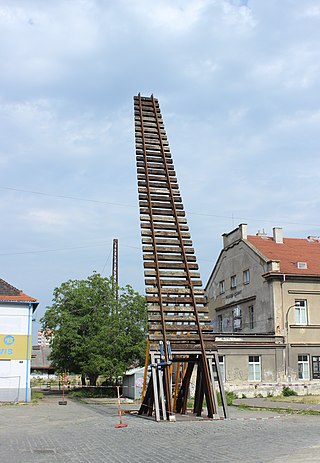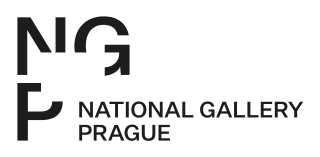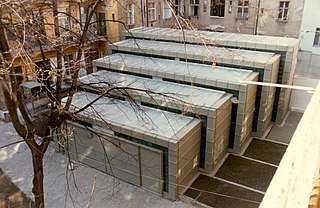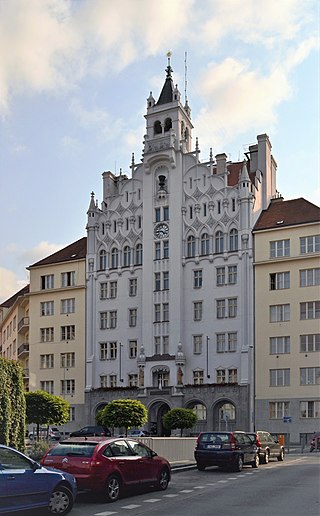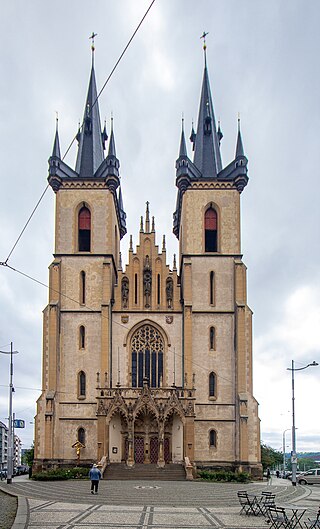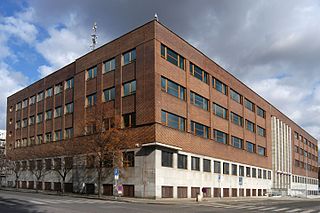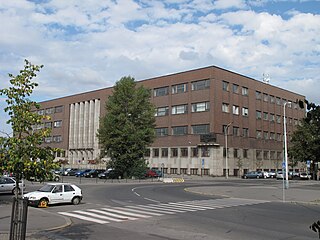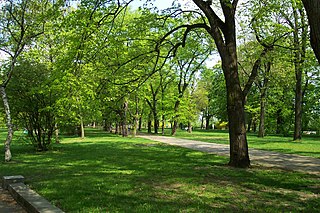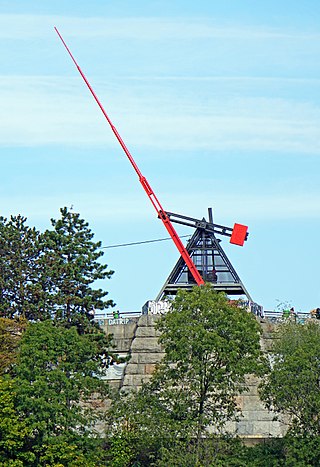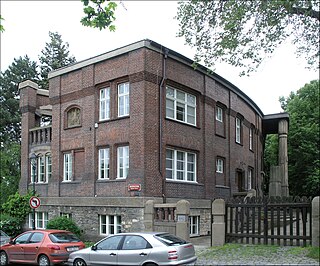Self-guided Sightseeing Tour #17 in Prague, Czechia
Legend
Tour Facts
4.5 km
121 m
Experience Prague in Czechia in a whole new way with our free self-guided sightseeing tour. This site not only offers you practical information and insider tips, but also a rich variety of activities and sights you shouldn't miss. Whether you love art and culture, want to explore historical sites or simply want to experience the vibrant atmosphere of a lively city - you'll find everything you need for your personal adventure here.
Activities in PragueIndividual Sights in PragueSight 1: Brána nenávratna
The Gate of No Return, designed by Aleš Veselý, is a monumental symbol of the place through which the wartime transports of Jews to concentration camps passed. It was erected on 9 March 2015 at the Prague-Bubny railway station, which is to become a memorial commemorating the place from which 50,000 Jewish citizens of Czechoslovakia were deported to the ghettos of Łódź and Terezín during World War II.
Sight 2: National Gallery in Prague - Trade Fair Palace
The National Gallery Prague, formerly the National Gallery in Prague, is a state-owned art gallery in Prague, which manages the largest collection of art in the Czech Republic and presents masterpieces of Czech and international fine art in permanent and temporary exhibitions. The collections of the gallery are not housed in a single building, but are presented in a number of historic structures within the city of Prague, as well as other places. The largest of the gallery sites is the Trade Fair Palace, which houses the National Gallery's collection of modern art. Other important exhibition spaces are located in the Convent of St Agnes of Bohemia, the Kinský Palace, the Salm Palace, the Schwarzenberg Palace, the Sternberg Palace, and the Wallenstein Riding School. Founded in 1796, it is one of the world's oldest public art galleries and one of the largest museums in Central Europe.
Sight 3: Alfred ve dvoře
The Alfred ve dvoře Theatre was founded by mime, director, choreographer, actor and teacher Ctibor Turba in 1997 in Prague. It is an experimental theatre of a new type, which does not have its own acting company or permanent repertoire, it lends its spaces to various artistic ensembles that go beyond the framework of ordinary theatre, especially in the field of non-verbal, movement and visual theatre, and thus provides a creative background for non-traditional theatre artists.
Sight 4: Husův sbor
The Hussite Congregation of the Czechoslovak Hussite Church in Prague-Holešovice is located in Farského Street in house number 1386/3, near Strossmayer Square. The street is named after Karel Farský, the founder and first patriarch of the Czechoslovak Hussite Church. The Hussite Congregation in Holešovice was built in 1935–1937 according to the design of architect František Kubelka as a multi-purpose new building. A prayer room lined with marble was established on the ground floor of the apartment building, and a columbarium was established in the basement, described as one of the largest in Europe. The dominant feature of the building is a Byzantine cross in the façade and a modernist tower with a chalice. The poet František Hrubín lived in the residential part of the Hussite Congregation.
Sight 5: svatý Antonín Paduánský
The Church of St. Anthony of Padua in Holešovice is a Roman Catholic parish church built in 1908–1911 in the pseudo-Gothic style according to the project of architect František Mikš. It is located on Strossmayerovo Square in Prague 7-Holešovice in the former village of Bubny. Since 2015, it has been protected as an immovable cultural monument.
Sight 6: Jan Bouchal
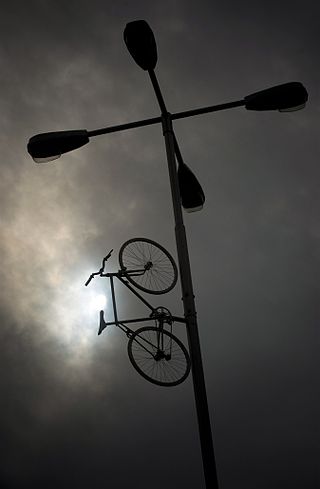
Bike to Heaven is a memorial dedicated to the promoter of urban cycling, Jan Bouchal, who died in a collision with a car, which according to the police investigation he caused, and to all other cyclists who died in traffic accidents in Prague. It consists of a fourteen-metre-high street lamp on which a bicycle pointing to the sky is suspended vertically at a height. The entire monument is "silver-plated" with palladium petals and the wheel and top of the lamp can rotate in the wind. The memorial is located at the busy Prague intersection of Dukelských hrdinů Street and the Kapitána Jaroše Embankment, at the place where Jan Bouchal was fatally injured in a car accident in 2006. The author of the monument is sculptor Krištof Kintera, the monument was unveiled on September 9, 2013, after seven years of preparations. It was initiated by the Auto*Mat association and financed from a public collection announced by this association.
Sight 7: svatý Kliment
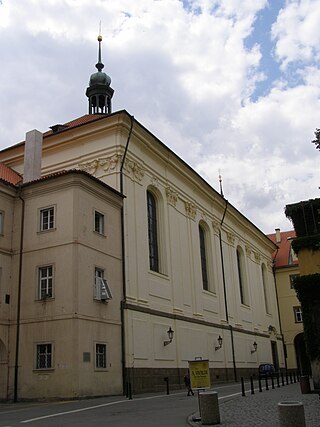
The Church of St. Clement in Prague's Holešovice, also known as the Church of St. Clement, is a subsidiary church in the parish of the Church of St. Anthony of Padua, before the construction of which it was the seat of the parish branch in what was then Holešovice-Bubny. It is located in the former village of Bubny in the area between Kostelní, Dukelských hrdinů and Skalecká streets above Holešovické lázně near Strossmayer Square. The church is a cultural monument of the Czech Republic (since 1964 it has been registered as a cultural immovable monument).
Sight 8: National Technical Museum
The National Technical Museum (NTM) is the largest Czech institution specializing in museum collections of a technical nature. The museum was founded on July 5, 1908 as the Technical Museum of the Kingdom of Bohemia. At present, it presents its collections in 21 exhibitions and a number of short-term exhibitions in the main building in Letná, in the branch of the Centre for Building Heritage in Plasy and in the Railway Depository in Chomutov.
Sight 9: National Museum of Agriculture
The National Museum of Agriculture in Prague's Letná district is located in Kostelní Street in the Prague 7 district. The functionalist building in the immediate vicinity of the National Technical Museum building is also the main exhibition building and the administrative headquarters of the institution, which has a number of other workplaces where individual sub-collections and scientific curatorial workplaces are located.
Sight 10: Letná Park
Letná Park is a large park on Letná hill, built on a plateau above steep embankments along the Vltava River in Prague, Czech Republic. Letná's elevation and location afford commanding views of the Prague Old Town.
Sight 11: Letná
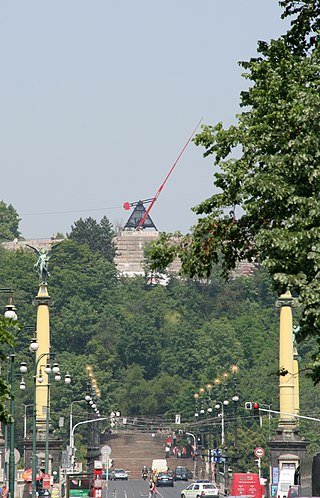
Letná is a hill overlooking Prague historic centre and Vltava River just besides Prague Castle. It neighbours Stromovka, the largest park in Prague. The hill belongs to Holešovice and Bubeneč quarters of Prague 7.
Sight 12: Prague Metronome
The Prague Metronome is a 75-foot-tall (23 m) functioning metronome in Letná Park, overlooking the Vltava River and the city center of Prague. The kinetic sculpture was erected in 1991, on the plinth left vacant by the late-1962 demolition of an enormous monument to former Soviet leader Joseph Stalin. The silent red metronome was designed by international artist Vratislav Novák, and officially named "Time Machine". It may be the largest metronome in the world, although Geneva and Gdańsk each have a larger pendulum clock.
Sight 13: Villa Bílek
The Villa Bílek is a house designed by the Czech sculptor and architect František Bílek in 1911. The villa is located in Hradčany neighbourhood of Prague, Czech Republic, several minutes walk from Hradčanská metro station or Prague Castle. It was designed originally for Bílek himself as his residence and studio.
Share
Disclaimer Please be aware of your surroundings and do not enter private property. We are not liable for any damages that occur during the tours.
GPX-Download For navigation apps and GPS devices you can download the tour as a GPX file.
